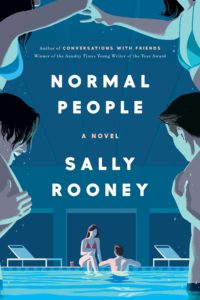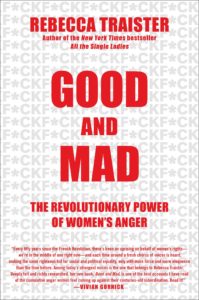
September is upon us, and with it the first crop of high profile Fall titles to be weighed, measured, and, in some cases, found wanting.
James Frey—whose largely fabricated memoir, A Million Little Pieces, drew the ire of, well, everybody, upon the exposure of Frey’s fraud back in 2006—is back with an sex-heavy autobiographical novel, Katerina, and the early reviews have been pretty savage. Alexander Larmon pulls no punches in his Observer takedown of the book and its “loathsome” protagonist: “A Million Little Pieces once threatened to derail Frey’s career. Fifteen years and many million sales later, the dreadful Katerina represents a new and, in its own perverse way, impressive attempt at career suicide.” Yikes.
Over at the Irish Times, Booker Prize-winning writer Anne Enright strikes a rather different tone in her glowing review of fellow countrywoman Sally Rooney’s Normal People. US readers will have until April to get their hands on Rooney’s acclaimed sophomore novel, which Enright says, “takes [the] themes of passivity and hurt and makes them radical and amazing.”
In her New York Times review of Small Fry—Lisa Brennan-Jobs’ memoir of growing up with Steve Jobs for a father—Melanie Thernstrom writes, “In the fallen world of kiss-and-tell celebrity memoirs, this may be the most beautiful, literary and devastating one ever written.”
We’ve also got Parul Sehgal on Sjön’s Icelandic epic, Lidija Haas on Rebecca Traister’s examination of female fury, and Sarah Blackwood on Lydia Kiesling novel of motherhood on the road.
*

“Lord be with the days when the job of the critic, especially the Irish critic, was to reassure everyone that a recently successful writer was no good, which is to say not as good as Proust. It is time to take a sharp inhale, people. After the success of Conversations With Friends, Sally Rooney has produced a second novel, Normal People which will be just as successful as it deserves to be: it is superb … This is a modern heroine, with a dissecting intelligence to keep her safe from her own difficulty and from the projections of others. In this she is like Rooney’s first heroine, Frances, who pushes back very brilliantly, telling her lover: ‘You’re interpreting your failure to hurt me as hostility on my part.’ It is important to be separate. Staying still, being matt black, this will keep you safe. Perhaps this is why the earlier work feels so ‘cool’ in the adolescent sense of the word. Do nothing and you will not be hurt. In fact, doing nothing is something her characters are really good at: the charm and difficulty of Conversations with Friends lay in the lovers intriguing passivity…Normal People takes those themes of passivity and hurt and makes them radical and amazing. There is an amount of sex in the book and the sensibility is entirely contemporary, but there is no hint of modernism here. Normal People has the engine of a 19th century novel; there is an encompassing sense of authority in the voice that makes it more terrible when the characters lives start to slip away from them. The book grows up under your eyes: it is so much wiser and more moral than you thought it would be … It adds, fearlessly, to an unsettling discussion about submission—I felt I understood something, at the end of it, that I had previously pushed away. But the truth is that this novel is about human connection and I found it difficult to disconnect. It is a long time since I cared so much about two characters on a page.”
–Anne Enright on Sally Rooney’s Normal People (The Irish Times)
*
“Those who have had the misfortune to come across a stranger masturbating in public usually feel a mixture of shock, revulsion and embarrassment. Much the same emotions are engendered when, on page three of James Frey’s much-awaited and largely autobiographical new novel, the protagonist, Jay, announces: ‘Follow your heart and follow your cock.’ Over the course of the book’s unedifying length, there is a great deal about Jay’s cock, and its machinations, which is described in tedious detail. What is never supplied is a reason why the reader should engage with Frey’s pretentious and vacuous alter ego … Frey has created a loathsome character whose antediluvian attitudes towards anyone who isn’t male, American and ‘a writer’ make this an unappealing and old-fashioned wallow in glorifying empty masculine privilege. Were Harvey Weinstein not awaiting trial on charges of sexual assault, he would undoubtedly be first in line to buy the film rights … The controversy behind A Million Little Pieces once threatened to derail Frey’s career. Fifteen years and many million sales later, the dreadful Katerina represents a new and, in its own perverse way, impressive attempt at career suicide. If this is to be his epitaph, let it at least be said of him that he followed his heart—and his cock.”
–Alexander Larmon on James Frey’s Katerina (The Observer)
*
“CoDex 1962 is the newly translated triptych by the Icelandic fabulist Sjon, heralded as an heir to Kafka and Borges. It contains every fictional element and effect I’m leery of—unicorns, for example. Elaborate framing devices. Moist ruminations on mythopoeia. Angels. Everything I can scarcely bear in novels, I found in this book. And I was spirited away—for a time … The spine of the story is a father’s anxious and tender care for his son, but the real action, the real feeling, is to be found in the otherworldly vignettes that cluster like pearls along the narrative, the forays into alternate dimensions where time can be murdered, nights when the dead float out of their graves to turn somersaults in the sky … This book is a Norse Arabian Nights. Each section is a honeycomb. Stories are nested in stories and crack open to reveal rumor and anecdote, prose poems, tendrils of myth. This abundance isn’t an empty show of virtuosity but rooted in Sjon’s belief in the power and obligation of old-fashioned storytelling … In comparison [to his earlier work], CoDex 1962—vast, riverine—is bloated. It has been touted as Sjon’s masterpiece, but it lacks the compression, celerity and discipline of the previous novels—those scythes, whose language cut and gleamed. I missed their stylishness, their ability to evoke mystery, not just describe it. CoDex 1962 raised me up, let me down and consumed me for the better part of a week. I can only echo Loewe, with gratitude, exasperation and awe. ‘This book’s a bloody thief of time.’ ”
–Parul Sehgal on Sjón’s CoDex 1962 (The New York Times)
*

“At the heart of Traister’s project, then, lies the question of who is angry and about what, whether anger in itself necessarily points to shared interests and goals, and whether women’s anger always bends toward the righting of injustices … This problem of the stark disparity in stakes for different women is one that Traister, to her credit, strives to address head-on throughout the book, though she can’t ever quite resolve it. At one point, she lists a number of substantive reasons why some progressives—including many black women—may not have felt satisfied with Hillary Clinton as a candidate…Yet there is an element of lip service in this, as Traister rushes straight on to the virulent misogyny from both left and right that she clearly feels is the only real explanation for Clinton’s defeat … Unfortunately, as Traister here and there admits, women can get just as furious when called out on their own racism as they can about structural injustice, and if there isn’t anything necessarily reactionary about rage, by the same token there’s nothing that revolutionary about it either. (Right-wing women such as Phyllis Schlafly, she concedes, have been angry, too.) At various points, Traister encourages those women who have been ‘waking up,’ post-Trump, to some of the nastier and more intractable elements of American life, to embrace and trust their own anger, and to listen carefully to the anger of women whose awakening happened a lot earlier. She can get a little fuzzy, though, on the question of what to do if and when you find that these two instructions conflict with each other … Still, while Traister’s focus on anger qua anger risks papering over some important political distinctions, it’s also understandable, when you consider what she’s up against. She offers a forceful if familiar inventory of the ways in which women’s anger in the public sphere is exaggerated, pathologized, and used to discredit them in a manner unimaginable for men.”
–Lidija Haas on Rebecca Traister’s Good and Mad: The Revolutionary Power of Women’s Anger (Bookforum)
*
“Small Fry will force readers to grapple with whether Jobs was not merely unmenschlike but a monster. It is not a stretch to say that if you read this book, you will never think of Jobs the same way again … Brennan-Jobs is a deeply gifted writer. Before I read her book, I wondered if it had been ghostwritten, like many such books. But from the striking opening—in which Lisa is drifting around her father’s house when he is dying of cancer, snubbed by everyone and pinching trifles from different rooms to appease her sense of exclusion—it is clear that this is a work of uncanny intimacy. Her inner landscape is depicted in such exquisitely granular detail that it feels as if no one else could possibly have written it. Indeed, it has that defining aspect of a literary work: the stamp of a singular sensibility. In the fallen world of kiss-and-tell celebrity memoirs, this may be the most beautiful, literary and devastating one ever written … The ultimate question for all of us is what image of our father we carry forward: our own ur-father, the internalized figure we choose to keep. Having sifted through the complex reality of her experiences, Lisa is finally free to claim her own myth: the fantasy of the father she longed for that allowed her to survive the father she had.”
–Melanie Thernstrom on Lisa Brennan-Jobs’ Small Fry (The New York Times Book Review)
*
“Where so many protagonists of road stories flee domesticity, Daphne can’t help but bring it along with her, in her ‘beautiful heavy boat’ of a 1997 Buick LeSabre. The Golden State anchors Daphne’s journey in the visceral and material realities of motherhood. She’s on her own with Honey, rendered so realistically by Kiesling that her ‘puppy smell’ almost wafts off the page … Even feminist versions of road stories—for example, The Price of Salt, Housekeeping, and Thelma and Louise—often idealize the highway as a place for the freedom and individualism that domestic ties, especially in the form of children, restrict. As Daphne, Alice, and Honey venture across eastern California, a revelation steals upon the reader: cutting ties, packing light, and setting out on one’s own is perhaps a masculine fantasy that we’ve been asked to idealize for too long. The Golden State suggests that what Huck Finn dismissed as ‘sivilizing’ is the practice of shaping ourselves in relation to other people, which can also be defined as love … The result is less an untroubled analogy between the landscapes of motherhood and the American West than an invitation to think more deeply about how limited our canonical literary imaginings of each have been.”
–Sarah Blackwood on Lydia Kiesling’s The Golden State (The New Yorker)

